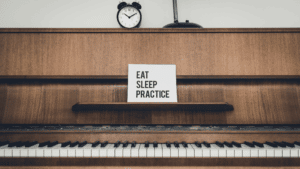Practice Tips Blog Posts

Practice Myth #5: Learn Then Memorize
The myth: You should memorize your piece after you learn to play it. The truth: It can be more beneficial to memorize your piece as

Practice Myth #4: Quality is More Important Than Quantity
Both quality and quantity go hand in hand to produce good practice results.

Practice Myth #3: Practice Everything Slowly
The myth: Practice everything slowly. The truth: Slow practice is extremely effective but can work even better if you intersperse practice at faster tempos. I

Practice Myth #2: Practice All Your Music Every Day
Research shows that timing the review of information is more important than daily repetition. Using thoughtful “spaced repetition” can get better results with less time spent on practice.

Practice Myth #1: You Should Practice Your Scales First
How many times have you sat down at the piano and immediately started playing scales? It seems to be built into our brains that scales must come first! Scales and other techniques are essential skills to develop, but it isn’t actually a requirement to play them before you hit your repertoire. In fact, you might achieve more success if you mix up your routine sometimes!

In Order to be a Great Musician, You Must First be a Great Practicer!
“How much did you practice this week?” is a question that pops up frequently. But perhaps the better question would be “How did your practice go this week?” Practicing encompasses so much more than a quantity of time, and it is a major step towards practice independence when students are able to self-evaluate what went well or what needs improvement.

Make Practice Life Easier with Erasable Colored Pencils
Do you and your students get lost in the sea of black pencil marks in their music? If you work on the same piece for long, it can get very confusing! My solution is to brighten up your lessons (and the sheet music!) with erasable colored pencils.
